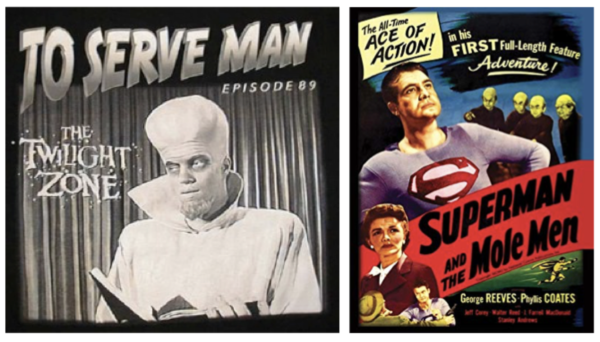A haunting memory
When I was 5, I saw episode #89 of Twilight Zone, “To Serve Man”, in which aliens came to earth promising a much better life on their planet. People queued up to make the intergalactic trip. As the ship full of human passengers took off, one woman discovered the truth: the aliens meant to serve us alright – as dinner!
That TV show from over 50 years ago has remained in my sub-conscious memory until recently. Such memories – and all their attendant emotions – can be triggered a lifetime later. Sometimes it’s hard to argue which is more powerful, our conscious “thinking” mind, or our sub-conscious “doing” mind [one thing it “does” is store our memories].
What I see
With the same clarity that I see the words I’m typing, I see life as Patanjali suggested we see it: from the inside out: as consciousness embodied, rather than as a body with consciousness. But for the life of me, I can’t help another living soul see it as I do.
As my guru says, therein lies my problem: I should be trying to see life as others do – and acting compassionately – rather than trying to “help” everyone else see their lives differently regardless of the profound benefits.
The frustration
Abandoning the desire to help others see what I see is difficult. I feel like the woman in the Twilight Zone episode who figured out the aliens’ plan – too late to save herself or her fellow passengers. Not a terrific analogy – but the hopelessness and irony are real.
Imagine a world in which what we looked, sounded or smelled like was of little concern: the exact opposite of our current state in which our essence, our consciousness, is of virtually no concern to anyone. If everyone saw life from the inside out, we’d all be more concerned about our collective wellbeing than appearances.
The benefits
Millennia ago Patanjali outlined the simple science of a) how our perpetually-functioning, dual-aspect mind works (i.e., our conscious mind is generally evidenced by our thoughts, and our sub-conscious mind is generally evidenced by our actions), and b) the life-altering benefits of realizing the distinction between our ever-changing body/mind and our unalterable, eternal consciousness.
Identifying with one’s immutable consciousness rather than one’s relatively weak, withering body/mind has very practical benefits: you no longer sweat the little stuff! Things that happen to our shell or ‘casing’ have zero affect on who and what we truly are. When we identify with the outside, every little ding and dent feels as though we’ve been injured. If we identify instead with the aspect of each of us without which we don’t even know we’re alive, life’s inevitable bumps and bruises, slings and arrows are a LOT easier to contend with.
Our consciousness is immutable: unchanging; unaffected by time, space, drought, hunger, disease, bullets, fears and desires – you name it.
“So what?” someone asked me recently.
Aside from the benefit of realizing that part of you is more powerful than Superman [he had to worry about kryptonite] you have within yourself evidence that part of you is immortal, essentially divine. That realization gives rise to faith, the most powerful, motivational force on earth.
Two other haunting alien memories
As long as I’m confessing to being afraid of aliens for most of my life, at about the same age (5), I was also scarred by watching the “Mole Men” episode of the “Adventures of Superman” in which the world’s deepest oil well penetrated the underground home of aliens who climbed to the surface!
About the same age, I had to change the channel five minutes into the initial episode of “My Favorite Martian” when his spaceship crash-landed on earth!
Change your perspective and change your life
Every moment of life is awesome and fascinating – but ever more so when seen from the inside out. Want to change how you view life? Pick up an interpretation of Patanjali’s Yoga Sutras, and reach out with any questions. I’d be honored to help shed light on your path to discovering the secret to lasting peace of mind.
Blessings, Allan Dowds




